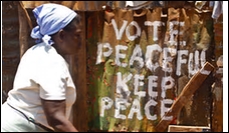
‘You cannot preach peace to an angry man’: elections in Kenya

Peter Oloo wiggles his way through the maze ahead of him, easily avoiding hitting, or getting hit by, the dozens of people moving between the narrow streets of Kibera, the largest slum in Kenya’s capital Nairobi. Every few metres he stops, fist-bumping childhood friends or respectfully bowing when shaking hands with older women.
“These were my mothers when growing up,” he says. “Here, we used to look out for each other. Everyone was their brother’s keeper.” Kibera is made up of 13 villages crammed into 2.5 sq kilometres and has an estimated population of 250,000 people. The unemployment rate in Kenya stands at 22%, with most of those being the young, many of whom live in informal settlements such as Kibera. “It is this group of people that is most vulnerable during this political season,” Oloo says. “Everyone lives peacefully here,” says his colleague Eric Mwanzia. “Until the politics start.”
On 8 August, Kenya will hold national elections. In Kibera, promises of employment opportunities and the provision of basic amenities such as reliable and clean water are cited in the manifestos of dozens of politicians seeking to represent the various parts of the slum. But as they sell their policies, they sell something else, too.
“Fear, intimidation, division and tribalism,” Oloo says. “All these make their way back into the day-to-day conversations of Kibera.”
For Mwanzia, who is part of a group called the Shofco Urban Network (SUN), the heightened hate speech and intimidation is all deja vu. “We know where this is heading, we don’t like it. But we know we can play a role to stop it,” Mwanzia says.(theguardian)…[+]










